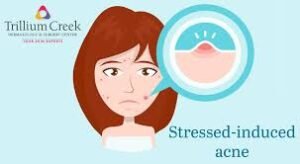Introduction: 
Dealing with acne, a prevalent skin issue affecting millions worldwide, may be difficult. Although there are a lot of over-the-counter and prescription treatments available, many people look for natural solutions to their acne problems. Thankfully, nature offers us abundant natural components and remedies that can reduce acne symptoms without harsh chemicals or negative side effects. This thorough guide will walk you through tried-and-true methods for treating acne at home so you may have the clear, bright skin you’ve wanted. always
Understanding Acne:  It’s important to comprehend the underlying causes of acne before attempting any treatment approaches. Hair follicles blocked with oil and dead skin cells usually cause acne. Several factors, including nutrition, stress, hormone fluctuations, heredity, and poor skincare practices, can aggravate acne.
It’s important to comprehend the underlying causes of acne before attempting any treatment approaches. Hair follicles blocked with oil and dead skin cells usually cause acne. Several factors, including nutrition, stress, hormone fluctuations, heredity, and poor skincare practices, can aggravate acne.
Effective Natural Treatments for Acne:

1. Proper Skincare Routine:
Cleaning: To get rid of extra oil, grime, and pollutants, wash your face twice a day, ideally in the morning and before bed, using a mild, non-comedogenic cleanser.
Exfoliation: To help unclog pores and remove dead skin cells, exfoliate your skin regularly using natural exfoliants like oatmeal, sugar, or baking soda. This will help prevent outbreaks of acne.
Moisturizing: To keep your skin moisturized without aggravating acne, choose moisturizers that are non-comedogenic and oil-free.
2. Dietary Adjustments: To help lower inflammation and support skin health, include foods high in antioxidants, such as fruits, vegetables, and green tea, in your diet.
Restrict your consumption of processed meals, sweets, and dairy items because these might cause breakouts of acne in certain people.
3. Hydration:  To keep your skin hydrated and remove toxins that may aggravate acne, drink lots of water throughout the day.
To keep your skin hydrated and remove toxins that may aggravate acne, drink lots of water throughout the day.
4. Natural remedies
Tea Tree Oil: Applied topically, tea tree oil’s antimicrobial qualities might help lessen inflammation and germs that cause acne.
Aloe Vera: Pure aloe vera gel can be used in acne-prone areas to relieve inflammation, lessen redness, and accelerate healing.
Honey and Cinnamon Mask: Make a paste out of honey and cinnamon, then apply it to the afflicted areas to help
5. Stress management:  Lower your stress levels, which can aggravate acne, by practicing stress-relieving methods like yoga, meditation, deep breathing exercises, or taking up a hobby.
Lower your stress levels, which can aggravate acne, by practicing stress-relieving methods like yoga, meditation, deep breathing exercises, or taking up a hobby.
Conclusion: although treating acne might be difficult, you can effectively control your symptoms and have healthier, cleaner skin by using a natural method. You may promote skin wellness from the inside and treat the underlying causes of acne by implementing good skincare practices, dietary alterations, natural therapies, and stress management. Recall that consistency is essential, so persevere and be patient in your efforts, and you’ll see the desired outcomes quickly.
Frequently Asked Questions (FAQs):
Q1: Are natural remedies as effective as over-the-counter products for treating acne?
A1: While results may vary from person to person, many individuals find natural remedies to be just as effective, if not more so, than conventional acne treatments. Natural remedies often have fewer side effects and can be gentler on the skin.
Q2: How long does it take to see results from natural acne treatments?
A2: It depends on various factors such as the severity of your acne, your skin type, and the specific remedies you’re using. Some people may see improvement within a few days, while others may take several weeks to notice significant changes.
Q3: Can certain foods worsen acne?
A3: Yes, some foods may exacerbate acne symptoms in certain individuals. Foods high in sugar, refined carbohydrates, and dairy products have been linked to increased acne breakouts in some studies. It’s essential to pay attention to how your diet affects your skin and make dietary adjustments accordingly.
Q4: Is it safe to use essential oils like tea tree oil for acne treatment?
A4: When used correctly, essential oils like tea tree oil can be safe and effective for acne treatment. However, it’s crucial to dilute them properly with a carrier oil to avoid skin irritation or allergic reactions. Additionally, it’s best to do a patch test before applying any essential oil to your face